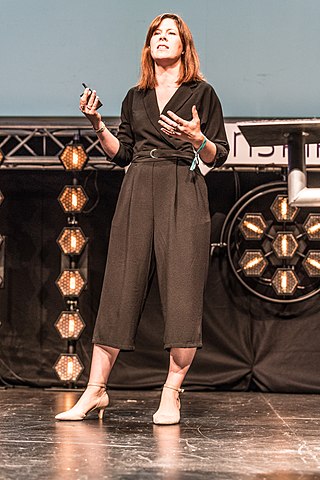Related Research Articles

In computing, a legacy system is an old method, technology, computer system, or application program, "of, relating to, or being a previous or outdated computer system", yet still in use. Often referencing a system as "legacy" means that it paved the way for the standards that would follow it. This can also imply that the system is out of date or in need of replacement.

Thurman John "T. J." Rodgers is an American billionaire scientist and entrepreneur. He is the founder of Cypress Semiconductor and holds patents ranging from semiconductors to energy to winemaking. Rodgers is known for his public relations acumen, brash personality, and strong advocacy of laissez-faire capitalism. He stepped down as Cypress CEO in April 2016 and Director in August 2016 after serving for 34 years.
Tungsten Automation, formerly Kofax Inc., is an Irvine, California-based intelligent automation software provider. Founded in 1985, the company's software allows businesses to automate and improve business workflows by simplifying the handling of data and documents.

Jeremy D. Allaire is an American technologist and Internet entrepreneur. He is CEO and founder of the digital currency company Circle and chairman of the board of Brightcove. With his brother JJ Allaire, he is a co-founder of the Allaire Corporation in 1995, which had an IPO in January 1999 and was acquired by Macromedia in 2001. Allaire was chief technology officer (CTO) of Macromedia after the acquisition and helped develop the Macromedia MX platform.

IONA Technologies was an Irish software company founded in 1991. It began as a campus company linked to Trinity College Dublin had its headquarters in Dublin, and eventually also expanded its offices in Boston and Tokyo. It specialised in distributed service-oriented architecture (SOA) technology, its products connecting systems and applications by creating a network of services without requiring a centralised server or creating an information technology project. IONA was the first Irish company to float on the NASDAQ exchange. It was valued at up to US$1.75 billion at its peak. It was one of the world's 10 largest software-only companies, and around 30 new ventures spun out from it. IONA was sold to Progress Software in 2008.
CA Wily Technology, formerly Wily Technology, Inc., is a software company based in California. Founded in 1998, it was purchased by CA, Inc. in March 2006, and CA Wily Technology is now a division of CA's Service Assurance business unit.
Eric R. Fossum is an American engineer who co-developed some of the active pixel image sensor with intra-pixel charge transfer, with the help of other scientists from the NASA Jet Propulsion Laboratory. He is a professor at Thayer School of Engineering in Dartmouth College.
Douglas (Doug) Levin is an American serial entrepreneur, technologist and business school adjunct faculty lecturer.

Splunk Inc. is an American software company based in San Francisco, California, that produces software for searching, monitoring, and analyzing machine-generated data via a web-style interface. Its software helps capture, index and correlate real-time data in a searchable repository, from which it can generate graphs, reports, alerts, dashboards and visualizations.

Code for America is a 501(c)(3) civic tech non-profit organization that was founded by Jennifer Pahlka in 2009, "to promote ‘civic hacking’, and to bring 21st century technology to government." Federal, state, and local governments often lack the budget, expertise, and resources to efficiently deploy modern software. Code for America partners with governments to help deliver software services, particularly to low income communities and to people who have been left out. "A large population of American citizens in poverty are not connected and exposed to government resources that they are eligible for—nearly US$60,000,000,000 worth of potential benefits for people in need remain unclaimed every year." Projects that illustrate the organization's impact include:
AppDynamics is a full-stack application performance management (APM) and IT operations analytics (ITOA) company based in San Francisco. The company focuses on managing the performance and availability of applications across cloud computing environments, IT infrastructure, network architecture, digital user experience design, application security threat detection, observability, and data centers. In March 2017, AppDynamics was acquired by Cisco for $3.7 billion. The software intelligence platform is used in enterprise and public sector SaaS applications such as the financial service sector, healthcare, telecom, manufacturing, and government for full-stack observability and IT infrastructure monitoring.
New Relic, Inc. is an American web tracking and analytics company based in San Francisco. The company's cloud-based software allows websites and mobile apps to track user interactions and service operators' software and hardware performance.
Mozilla is a free software community founded in 1998 by members of Netscape. The Mozilla community uses, develops, publishes and supports Mozilla products, thereby promoting exclusively free software and open standards, with only minor exceptions. The community is supported institutionally by the non-profit Mozilla Foundation and its tax-paying subsidiary, the Mozilla Corporation.

Phil Libin was born February 1, 1972 in Leningrad, USSR and moved to America when he was eight years old. He was CEO of the Silicon Valley software company Evernote from 2007 to 2015, then became Executive Chairman of Evernote's board. In September 2015, Libin joined General Catalyst Partners as its fourth general partner in Silicon Valley. In September 2016, Libin stepped down as Executive Chairman of Evernote's board of directors to focus on his role at General Catalyst Partners.
SourceClear or SRC:CLR was an American software company with its namesake security tool for software developers. SourceClear focused on open-source software development, plugging into developers' existing workflows and examining security risks of open-source and third-party code in real time. The company was headquartered in San Francisco, California with an office in Singapore. It had customers in the technology, social media, retail, finance, and defense industries. In October 2015, it announced a $10 million Series A round of funding. In 2018 it was acquired by CA Technologies; after which it was folded into Veracode.
Robert "Bob" Fabbio is an American entrepreneur, technologist, and venture capitalist. He is best known for founding companies in and around Austin, Texas.

James Walter Melvin is an American entrepreneur, investor, and philanthropist who founded and served as the CEO of several notable software companies in the foodservice and hospitality industries. His software products have been installed at more than 125,000 stores worldwide for companies such as McDonald's, YUM! Brands, Burger King, Wendy's, Disney, Darden Restaurants, K-Mart, Costco, FedEx, Walmart, Foot Locker and many others.
Netguru is a Polish software development and software consultancy company founded in 2008. Headquartered in Poznań, Poland, it's a globally operating business, with local offices including Warsaw, Kraków, Wrocław, Gdańsk and Białystok. It provides software design and product design, both for early-stage startups and corporations.

Patricia Scanlon is an Irish technologist and businesswoman. She founded SoapBox Labs in 2013, a company that applies artificial intelligence to develop speech recognition applications that are specifically tuned to children's voices. Scanlon was CEO of SoapBox Labs from its founding until May 2021, when she became executive chair. In 2022, Scanlon was appointed by the Irish Government as Ireland’s first Artificial Intelligence Ambassador. In this role, she will "lead a national conversation" about the role of AI in people's lives, including its benefits and risks.
Andrew Palmer is an American technologist, Internet entrepreneur, and investor.
References
- ↑ "Lew Cirne, New Relic Inc: Profile and Biography". Bloomberg Businessweek. Archived from the original on December 3, 2013. Retrieved 1 October 2013.
- 1 2 Harris, Derrick (15 February 2011). "Startup Strategies: How Lew Cirne Made New Relic a SaaS Success". GigaOM. Retrieved 1 October 2013.
- ↑ Taulli, Tom (5 February 2013). "New Relic Nabs $80M To Upend the Software Biz". Forbes. Retrieved 1 October 2013.
- 1 2 Wasserman, Noam. "Wily Technology: Interview With Lew Cirne and Henry McCance, Video". Video case study. Harvard Business Review. Retrieved 1 October 2013.
- ↑ "How a Coder Launched A $375 Mil Company from His Living Room - with Lew Cirne".
- ↑ Clarke, Gavin (18 October 2010). "Wily founder returns with cloud management". The Register. Retrieved 1 October 2013.
- ↑ Shinal, John (3 June 2013). "New Relic headed for an IPO". Market Watch. Retrieved 1 October 2013.
- ↑ "New Relic CEO Lew Cirne steps down, replaced by industry veteran Bill Staples". SiliconANGLE. 2021-05-13. Retrieved 2022-06-13.
- ↑ "New Relic to Promote Cloud Industry Veteran Bill Staples to CEO". ir.newrelic.com. Retrieved 2022-06-13.
- ↑ Taulli, Tom. "New Relic Nabs $80M To Upend the Software Biz". Forbes. Retrieved 2022-06-13.
- ↑ "Lew Cirne '89 | Trinity College School". www.tcs.on.ca. Retrieved 2022-06-13.
- ↑ "Lewis K Cirne - Inventor". Patent listings website. IPEXL. Archived from the original on 9 February 2015. Retrieved 1 October 2013.
- ↑ Haas, Genevieve (20 October 2006). "Gift goes to support undergraduate entrepreneurship". Dartmouth News. Retrieved 1 October 2013.
- ↑ "Northumberland County News - Latest Daily Breaking News Stories".
- ↑ "Cirne Hall is officially dedicated and blessed | Trinity College School".
- ↑ "The rise of the app economy". Web video. GigaOM. Retrieved 1 October 2013.
- ↑ Williams, Alex (27 May 2013). "What Would Square's Jack Dorsey Do?". TechCrunch. Retrieved 1 October 2013.
- ↑ "New Relic Lewis Cirne Named Ernst & Young Entrepreneur of the Year 2013 Finalist in Northern California". Market Wired. 20 May 2013. Retrieved 1 October 2013.